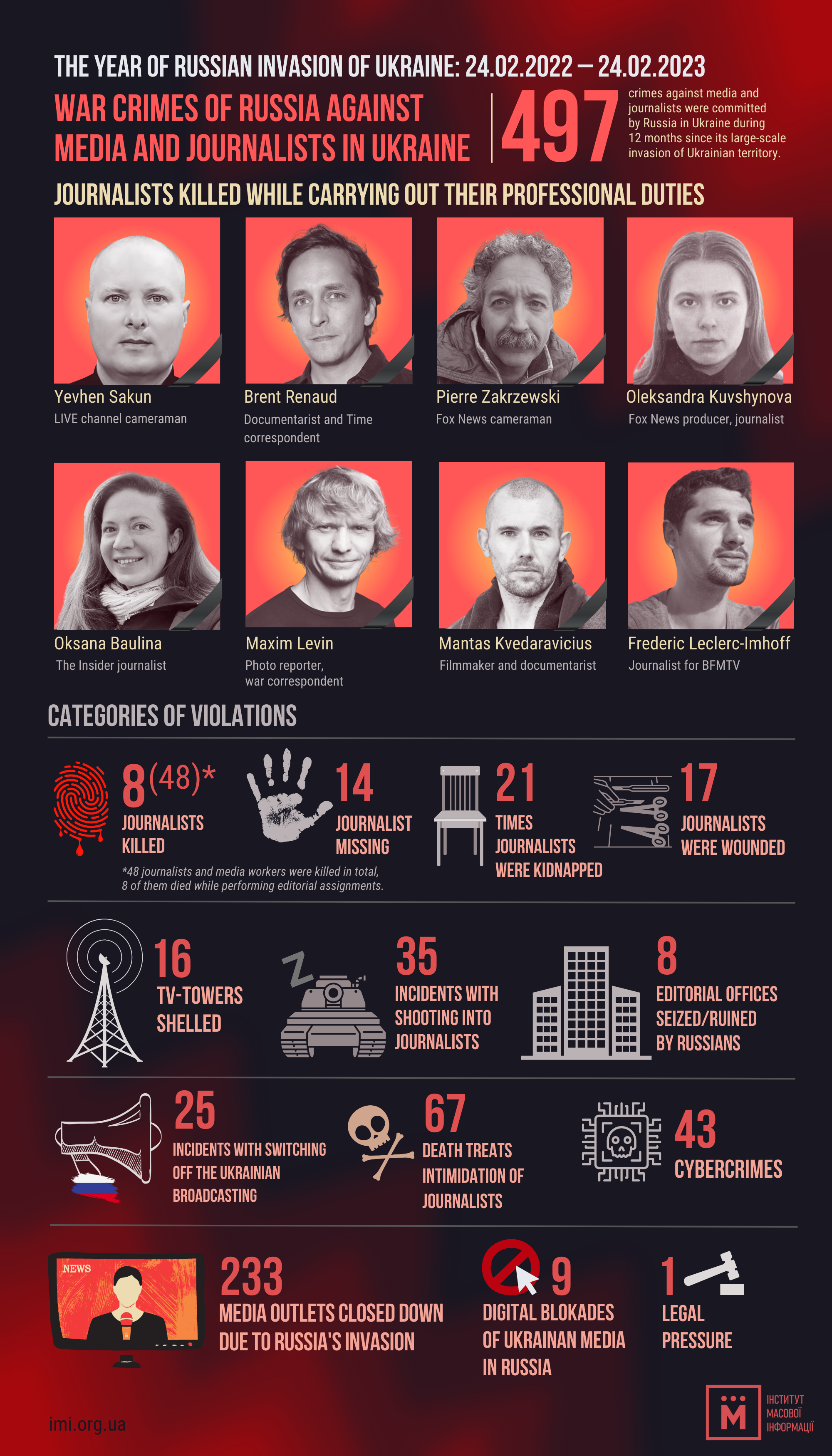In the year that has passed since the beginning of the full-scale invasion, Russia committed 497 crimes against journalists and media in Ukraine.
This is evidenced by the Russian War Crimes Monitoring by the Institute of Mass Information.
As of February 24, 2023, 48 media workers in Ukraine have been killed by the Russian armed aggression. Eight of them died while performing their journalistic duties, 27 died as combatants, and 13 were killed by Russian shelling or torture.

IMI recorded 35 cases journalists being attacked by the Russians. At least 17 journalists were injured in the course of their work. Namely, journalists have suffered concussions, broken or injured limbs, and shrapnel wounds as a result of Russian shelling.
IMI recorded 21 cases of journalists being captured or kidnapped by Russian occupiers. Journalists have been abducted and captured in five oblasts: Kyiv, Zaporizhzhia, Kherson, Luhansk, and Kharkiv. The Russians have kidnapped the most journalists (9) in Kherson oblast. UNIAN journalist Dmytro Khyliuk remains in Russian captivity to this day.
In the year since the beginning of the big war, the Russians have shelled TV towers 16 times; those are considered civilian objects. This caused the television and radio broadcasting to disappear completely or temporarily in nine oblasts of Ukraine.
The Russians have seized the editorial offices of at least 25 Ukrainian media outlets for the deilberate purpose of distributing their aggressive propaganda in the occupied territories of Ukraine.
The large-scale Russian invasion resulted in at least 233 media outlets closing down completely or temporarily. The media had to close due to Russian occupiers threatening them directly, their offices being seized, being unable to work under the temporary occupation, their working spaces being destroyed, or the financial crisis caused by the Russian war.
Over the year, the Russians have carried out numerous DDoS attacks (43 cases) on Ukrainian online media websites covering Russia’s war on Ukraine. The Russian cybercrimes included media websites being hacked, news being replaced with Russian manifestos, Russian symbols or calls for surrender being posted, etc. In addition, IMI recorded phishing attacks on Ukrainian news teams and journalists.
Also, IMI recorded 67 cases of threats being sent to journalists and editors of both national and regional media. At first, the occupiers were threatening the journalists physically (by coming to the homes of journalists or their parents); later, the threats moved over to the online realm (by way of e-mails with threats of criminal prosecution, imprisonment, torture, interrogations and nuclear weapons).
“I want to express my gratitude and respect to all Ukrainian media workers who stood up during the Russian aggression. Journalists helped the world learn about the events in Ukraine and about Russia’s role in the war, preventing the distortion of facts and the spread of Kremlin propaganda. Journalists have documented many crimes, including murder and torture, and reported this information to the world despite constant risks, shelling, and the full range of challenges that a war brings. Many Ukrainian media workers have became victims of the occupiers’ violence, as they tried to silence them. The indomitability and courage of journalists have become an vital contribution to the fight against the aggressor, to the protection of democratic values and the preservation of life in Ukraine,” said Oksana Romaniuk, executive director of the Institute of Mass Information.
Read more here.
We remind that IMI recorded 567 freedom of speech violations in 2022. Over 80% were committed by Russia.
